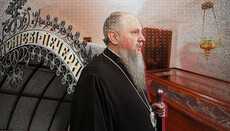Three lines of action against the UOC
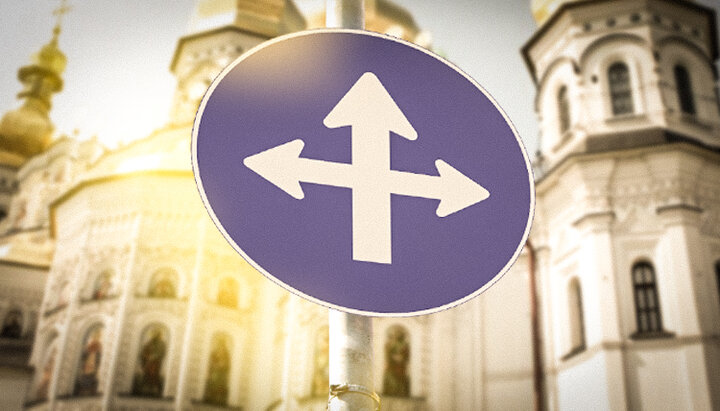
Recently, three lines of action against the UOC have emerged: desecration of churches, a ban on activities and illegal transfers to the OCU. What to do in these cases?
As the war in Ukraine develops, our Ukrainian Orthodox Church is under increasing pressure. And in addition to the physical destruction of churches through shelling, "hostilities" against the UOC are taking place on several internal "fronts" at once.
Desecration of temples
The most "innocuous" attacks against the UOC are the desecration of churches, offensive graffiti and threats to the clergy or believers. For example, on the night of May 8, 2022, St. Prince Vladimir’s Church was desecrated in Lviv. The entrance doors were filled with filling foam and the walls were painted with graffiti: "Russians aren't people", "FSB devils", "Putin's house".
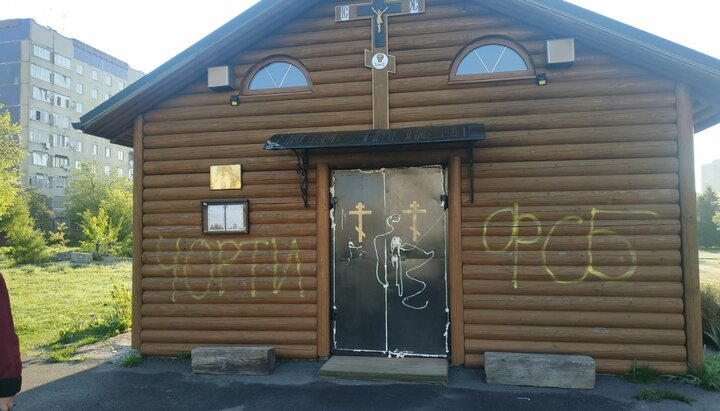
A few days earlier, on Bright Monday, 25 April 2022, a man with a gun drove up to the church on a jeep and threatened to demolish the building, shouting: "Death to Moskals!” At the same time, a video shot by the church's parishioners shows the man filming everything on his phone, from which one can assume that the purpose of the visit (at least one of them) was to post it on social media.
The purpose of such actions is clear – to intimidate and exert psychological pressure. Here it is pertinent to remember the Lord's call, which is often heard in the Scripture in very different situations: "Do not fear! In the synodal translation of the Bible, this call appears over 400 times. Folk wisdom also tells us that only those are afraid who fear. So, the first thing to do is to try to find the strength not to give in to this psychological pressure. And if not, we should follow the advice of the Apostle James: "If any of you lacks wisdom, you should ask God, who gives generously to all without finding fault, and it will be given to you. 6 But when you ask, you must believe and not doubt, because the one who doubts is like a wave of the sea, blown and tossed by the wind" (James 1:5,6).
The second thing to do is to document all these incidents and go to law enforcement agencies for legal protection of your rights. This may not work right now, but in the future, it can provide the necessary legal basis for defending the rights of each particular community and the UOC as a whole. In addition, we should not discount the possibility of appealing to the European public, which is used to responding to cases of infringement of someone's rights, as well as the possibility of recourse to international judicial bodies. Figuratively speaking, every documented case of violation of the rights of the UOC helps the representative of the UOC to the European international organizations, Bishop Victor (Kotsaba) in his work.
Decisions by local authorities to ban activities
The tendency to prohibit the activities of the UOC by decisions of local authorities that began in the western regions of Ukraine has reached Konotop. The mayor of the city, Artem Semenikhin, not only signed an order to ban the UOC from the city but also ordered that the assets of the churches be sealed and the churches be placed under guard. By the way, it is the same mayor who in April 2020 gave the order to dig roads around the UOC churches, disconnect their electricity and water, as well as to terminate their rental contracts.
Decisions to ban the UOC were also taken in Drohobych, Horodok, Neteshyn, Brovary, Ovruch, Kaziatyn and elsewhere.
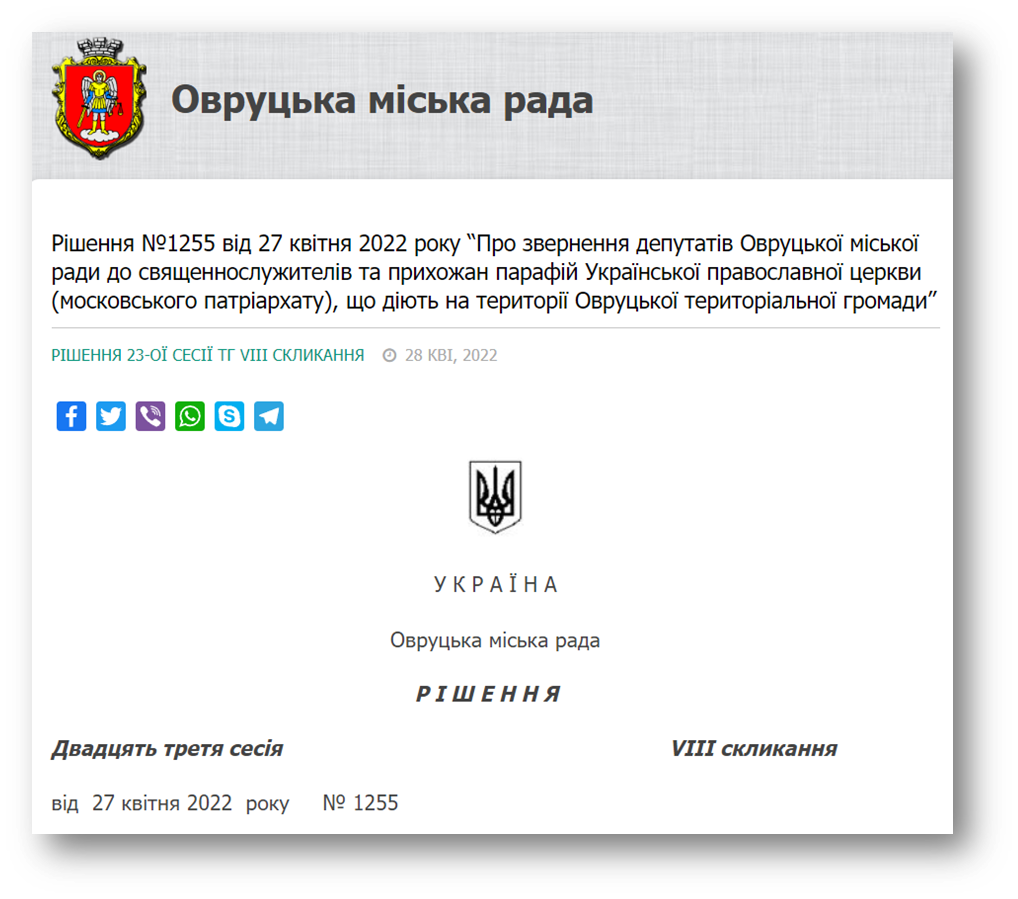
It comes to ridiculous things. The mayor of Kaziatyn Tetiana Yermolayeva urged the UOC believers to move not only to the OCU but also to Uniates, Catholics or even Protestants.
Neither local councils, nor mayors, nor executive committees have the right not only to prohibit but even to restrict activities of religious organizations.
The decisions by local governments to ban the activities of the UOC are illegal. According to the law of Ukraine "On Local Self-Government", neither local councils, nor mayors, nor executive committees have the right not only to prohibit but even to restrict activities of religious organizations. Under Article 16 of the Law of Ukraine "On Freedom of Conscience and Religious Organizations", the activities of a religious community can be terminated only by a court decision, and only in strictly defined cases, and by the decision of the community itself.
The law "On the Legal Regime of Martial Law" does not change anything in this respect. It is therefore necessary to promptly file complaints with the courts and the law enforcement agencies. The fact that representatives of these very bodies take part in meetings and readily obey when mayors give them illegal orders to seal up churches does not change the matter. Ukraine is a state governed by the rule of law, as it is written in the Constitution. And if we want to join the European Union in the future, we will have to prove it in practice. There is a procedure of community liquidation, there is the law "On Freedom of Conscience", which regulates the procedure of the transfer from one denomination to another. You must abide fully by all of this! To take obviously illegal decisions is a crime against the European choice of Ukraine, not to mention the division in the society, which is unacceptable at wartime.
The unlawfulness of the Brovary Council’s actions has already been stated by the Legal Department of the Boryspil Eparchy. The UOC's ban is called null and void, and in the case of blocking the entrance to churches, the lawyers advise to apply to the police with a criminal complaint because the act falls under Article 180 of the Criminal Code of Ukraine "Preventing the Performance of Religious Rites". The maximum penalty for this offence is up to two years in prison.
Again, even if attempts to defend one's rights in the legal field do not yield immediate results, they may play a role in the future.
Illegal transfers
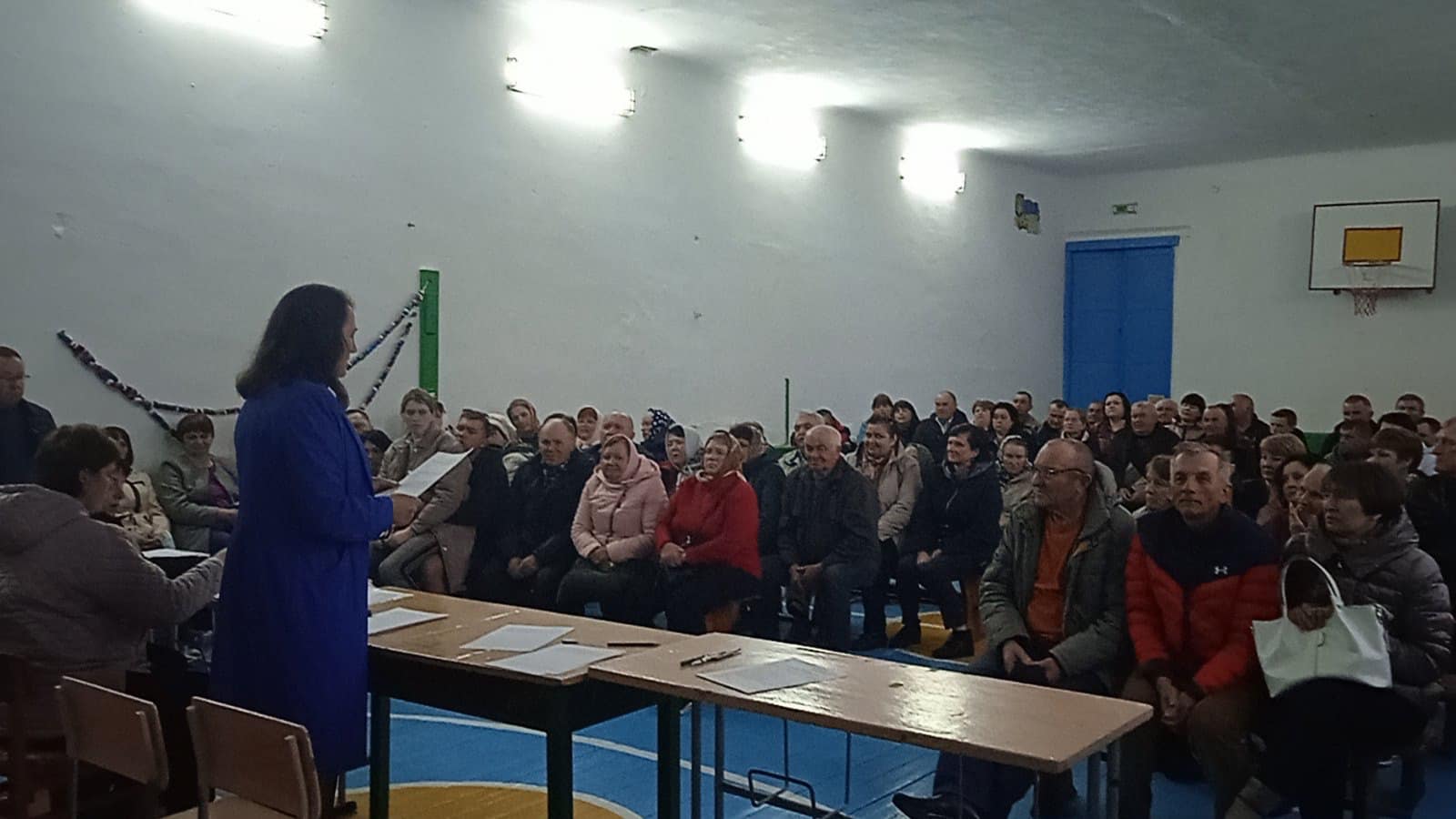
Today this form of pressure on the Church has also intensified. It was quite popular immediately after the creation of the OCU, when under Poroshenko's rule, zealous officials rushed to transfer the communities from the UOC. The raiding scheme looked straightforward: the local authorities organized a meeting of the territorial community under the guise of a meeting of believers. In other words, residents of the village or town, who did not go to the church, decided to transfer the church community to the UOC. This is illegal because only the religious community, not the territorial community, can determine the fate of the parish. Article 8 of the law "On Freedom of Conscience" says that the decision to change the subordination of a religious community must be made by at least two-thirds of its members. Each member of the community must attest to this in writing.
Nevertheless, now almost every day there are photos of "transfers", where some people, led by officials, gather in clubs or school gyms and decide the fate of the church community.
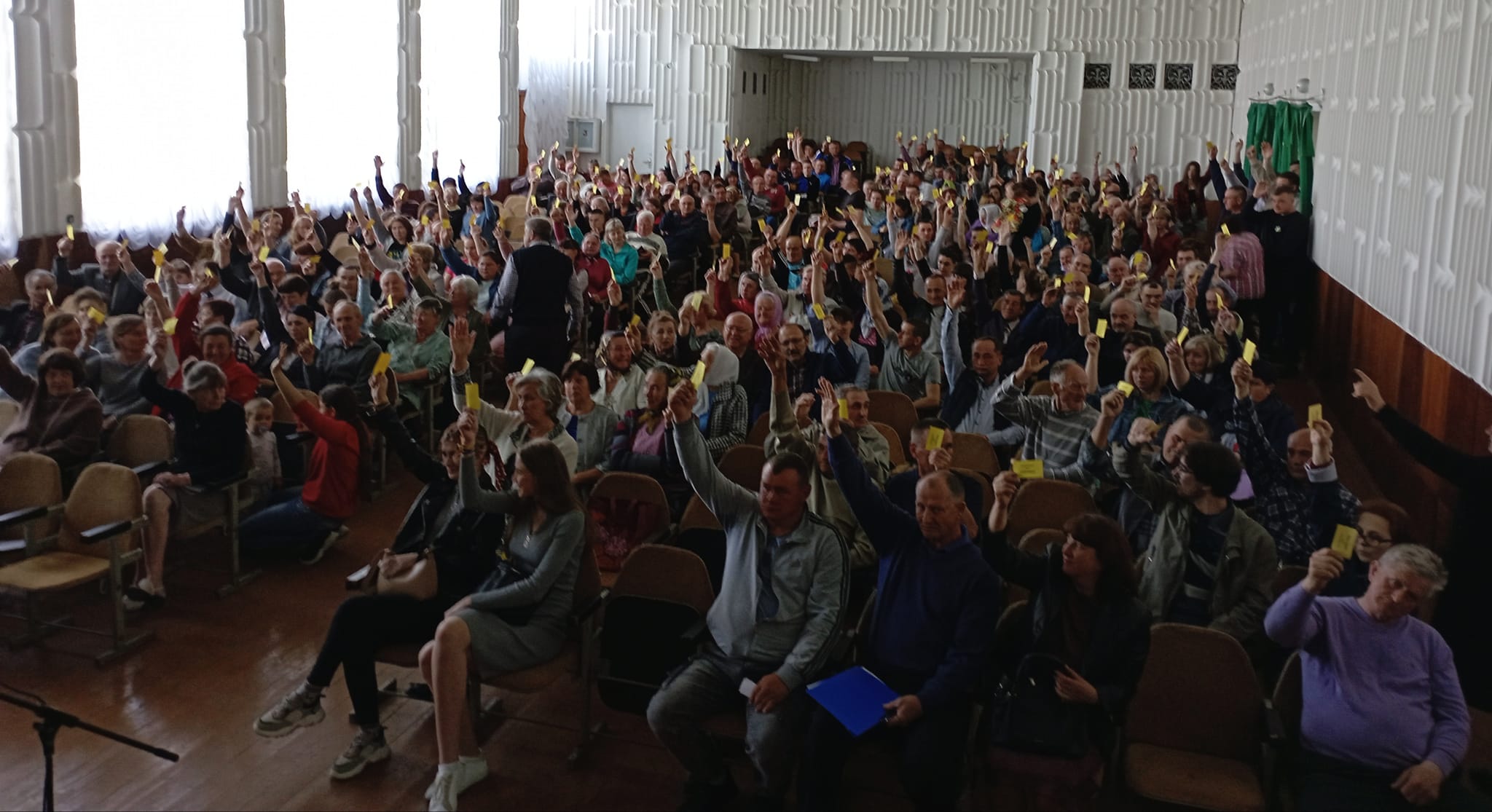
Many now believe that it is not necessary to pay attention to the requirements of the law. A recent example is Shepetivka. There, on May 7, 2022, the mayor of the city, Vitaliy Buzil, a representative of Eurosolidarity (formerly Petro Poroshenko Bloc) organized a meeting not even of the territorial community but simply of all who wished to do so in front of the UOC cathedral.
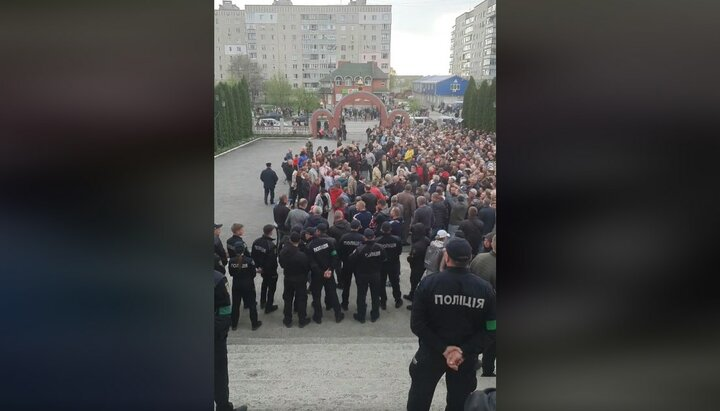
Among those gathered, as is the custom in such cases, were public-sector employees: teachers from local schools and others. Almost all of those present, as the parishioners of the cathedral told a UOJ correspondent, had nothing to do with the St. Michael community. Accordingly, they had no right to decide their fate. The cynicism of the authorities went so far as to say that the vote to "transfer" was taken right "under the nose" of the community, whose faithful were standing in front of the cathedral door praying during the meeting.
In such cases, you should also assert your rights through legal means – to file lawsuits, to write complaints and petitions to law-enforcement agencies, etc. No one can say how things will turn out in the future, but in the past this method has been quite effective. For example, in February-March 2019, courts in Volyn, Chernivtsy, Rivne, Khmelnytskyi and Kyiv regions decided on appeals from UOC religious communities about the seizure of churches and other illegal actions of officials and obliged prosecutors and other authorized persons to launch investigative actions in connection with the illegal transfers of UOC churches to the OCU.
In October 2020, the Desnianskyi District Court in Chernihiv ruled that the decision of the Chernihiv RSA to re-register the Orthodox community in Parafiyivka of the Ichnia district, Chernihiv region, into the OCU was illegal and overturned it. The court ruling explicitly stated that the re-registration of the UOC community "took place against the will of the religious community, without the Parish Assembly members and not from the parishioners, without the participation of the rector and contrary to the Law of Ukraine 'On Freedom of Conscience and Religious Organisations', in a manner not provided by the Statute and contrary to the court decision prohibiting any registration activities”.
The main factor
But the most important factor in the UOC believers' defence of their rights is not the ability to prepare legal documents or go to court, but the loyalty of the parishioners to their Church, their conscious understanding of why they belong to the UOC and not to some other denomination.
Quite revealing in this respect are the words of Ihor Sapozhko, the mayor of the town of Brovary, where on May 6, 2022, the activity of the UOC was suspended by the decision of the Brovary town council.
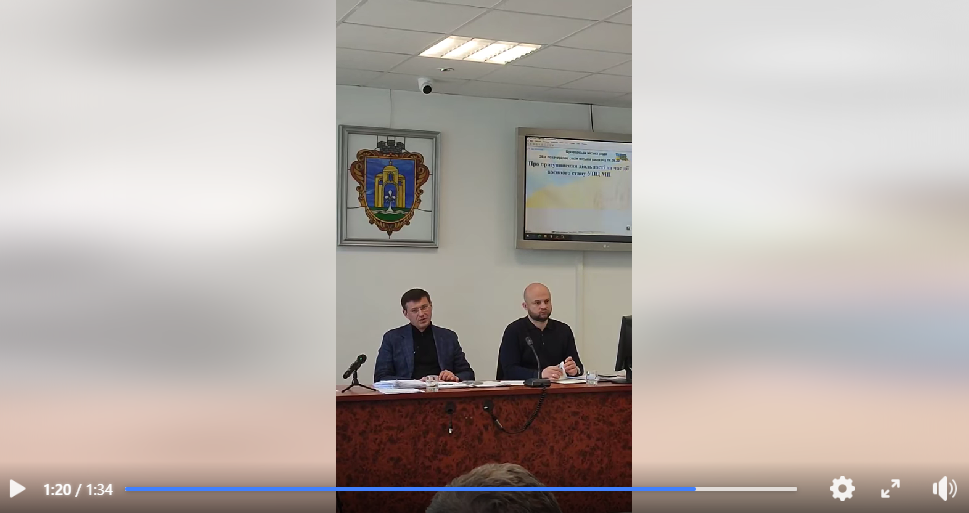
I. Sapozhko: "I see no point in talking to representatives of the Moscow Patriarchate about the transfer. I think that when making such a decision, it is very correct to communicate with the parishioners of these churches, which can ask people to make these decisions."
Two points are indicative here.
Firstly, the mayor considers talks about the transfer with the clergy to be useless. This means that the clergy of the UOC are fully aware that to leave the UOC in any way is a betrayal of the Church of Christ and leaving the Ark of Salvation, which the Church is. The clergy in most cases remain faithful.
Secondly, the representative of the local government believes that the parishioners are the weak link that one can try to persuade to defect to the OCU. Here the key role is whether the rector of the community has succeeded in instilling in his flock a genuine faith and true ecclesiality. Did he teach them to believe in "the One, Holy, Catholic and Apostolic Church," or was he simply a requester for them? Outwardly similar rites can be performed by an OCU "priest", but it is only true priests of God who can unite a person with Christ, perform true sacraments of grace and lead to God. The parishioners' understanding of this is the main condition for all attempts to destroy the Orthodox community to be in vain. Even if they take away the church, the community will not go anywhere.
To all the enemies of the UOC, we would like to remind the words of St. John Chrysostom: "There is nothing stronger than the Church of Christ. Whoever wants to fight with it will inevitably ruin his forces: it is the same as to make war against heaven".









